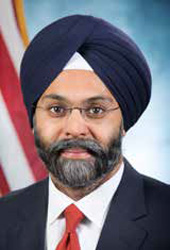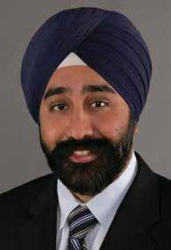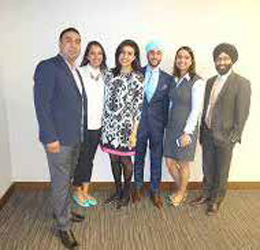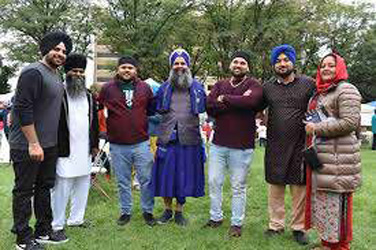Organisations in other Sectors
It is not only in business or profession that Sikh organisations are working, there are organisations who strengthen the position of Sikhs in various services also. For example, there is a Sikh officers association in USA which aims at strengthening the relationship between the Sikh Americans and law enforcement by promoting the Sikh values of justice, equality and selfless service. It is this organization, which made efforts for getting the Newyork Police Department’s Policy changed in favour of Sikhs by allowing them to wear Turbans. Further, this organization of NYPD Sikh officers Association encouraged other Sikhs to join the law enforcement. During this year, when the Newyork Police got its first female Turbaned Sikh Auxiliuary Police Officer (Gursoach Kaur), it was a big achievement for them. This officers association not only voices the concern of the Sikh community, and encourages Sikhs to join the service, but also participates in charity work, recruitment events and educating the youth about law enforcement.
Organisations for promoting Sikhs in Politics
It is known fact that Sikhs have made their position strong not only in Indian politics, but more than that in the politics of other countries also. There are two turbaned Sikhs Ministers in Canadian Parliament. There is a turbaned Sikh Member of Parliament in U.K. and Malaysia (Minister also). There are Sikhs active in politics even in other European and East Asian countries. In Australia also, they are coming up to hold political position. Although, India is their country of birth and origin and they are visible in politics of centre as well as states, they don’t have a strong political party to protect their interest and take up their issues at the appropriate levels. Shiromani Akali Dal in the only political party which appears to be a Sikh party. It was formed on 14 December 1920 as an associated political organisation with the Sikh religious body, SGPC. S. Sarmukh Singh Chubbal was the first President of the then Akali Dal, it became prominent under the leadership of Master Tara Singh. He remained leader for a long time and was there even when Sikhs had to fight for the creation of a Punjabi speaking state. This party was being led by S. Parkash Singh Badal till when he passed on the leadership to his son S. Sukhbir Singh Badal. Presently, he is the President of the main group of Akali Dal, though there are other splinter groups also using this name. The two other groups known as Akali Dal along with the name of their leader are Shiromani Akali Dal (Amritsar) led by S. Simranjit Singh Maan in Punjab and Shiromani Akali Dal, Delhi led by S. Paramjit Singh Sarna. Recently, SAD has witnessed another split as its veteran leaders have floated a parallel party named as Shiromani Akali Dal (Taksali) in which S. Ranjit Singh Brahmpura has been named as the President and Dr. Ratan Singh Ajnala as the Senior Vice President. S. Sewa Singh Sekhwan has becomes its Secretary General. This party has announced that they will get registered with election commission of India and may contest any election in the future, particularly SGPC election. They want this election to be held at the earliest.
Sikhs in other Political Parties
As mentioned above, the Akali Dal has split in a number of groups, many Sikhs not satisfied with them are members of other political parties like Congress, BJP, SP, BSP and so on. Despite, their participation in politics through many parties, the Panthik issues have never become an agenda of any of the political parties and as such they are facing a number of problems in present times. However, their position in foreign countries has improved in this field because of their qualities of hard work sincerity, dedication and humanity in the true spirit of Sikh principles of Sarbat Da Bhala. In U.K. we have an ‘All Party Parliament Group on Mentoring and Sikhs’, which is presently headed by the first Sikh lady Member of Parliament Preet Kaur Gill.
Sikh PAC
When a Sikh gentleman named S. Gurinder Singh Khalsa was asked to remove his turban at buffalo airport when he was to fly to his home Sacramanto, he refused. Being an American citizen, he felt humiliated and decided to form a Sikh based organisation across the country to prevent such incidents with other Sikhs in the coming times. He used all his contacts and with his lobbying efforts in Congress got a change made in TSE head were policy that now allows Sikhs to pass through airport security while wearing their turbans. He did not stop their at in 2016, setup a Sikhs PAC, a political committee that today influences the election in 2020. As this committee functional in Indiana state of USA, Khalsa Ji wants Sikh leadership to emerge in that place as powerful as to become a major factor in influencing the election. In 2016 only this organisation collected more than $375,000 and made donations to both the Democrat and the Republican candidates in races for Governor, state schools superintendent and attorney general.
Its goal is to bring awareness to the estimated 10,000 Sikhs living in Indiana, many of whom are immigrants from India. They own 3,500 businesses here-many of which are gas stations, convenience stores and trucking companies. Part of their awareness campaign is to teach others the significance of the turbans worn by Sikh men, and some women. With 25 million adherents, the Sikh faith is the fifth-largest in the world, but Khalsa thinks it remains largely unknown. Ignorance fuels fear. “Pepole see it and they think ‘Osama bin Laden,” Khalsa said of the dastaar. After the 9/11 terrorist attacks, images of the white turban al-Qaida leader saturated the media. “We became victims of violence,” he said. “People looked at the news and saw Osama in a head scarf, and they thought he was one of us.”
Since 9/11, the New York-based Sikh Coalition has reported 700 incidents of violence or harassment against members of the faith living in the United States. Being visibly faithful is an integral part of Sikh life. The religion, founded in 1469 in the Punjab region in India and Pakistan, teaches that people are essentially equal in God’s eyes. Its founders, rebelling against India’s strict caste system, exhorted followers to don the turban to symbolize that equality. But it’s not just a political statement. It’s a declaration of humility before God, Khalsa said. “To be asked to remove it is painful,” he said. “It’s a violation of our faith.” Politically, Khalsa would like to see state education leaders encourage schools to add an explanation of the faith to a world cultures, curriculum that already teaches students about Christianity, Judaism, Hinduism, and Islam. And he’d like the General Assembly to eventually pass a hate crimes bill – legislation that’s been rejected in the past. Both ideas seem ambitious in the Statehouse, but Khalsa is an optimist. He is convinced Americans are willing to embrace diversity. “In this country, if you ask for something, you can get it,” he said. “It’s what makes this country great.”




